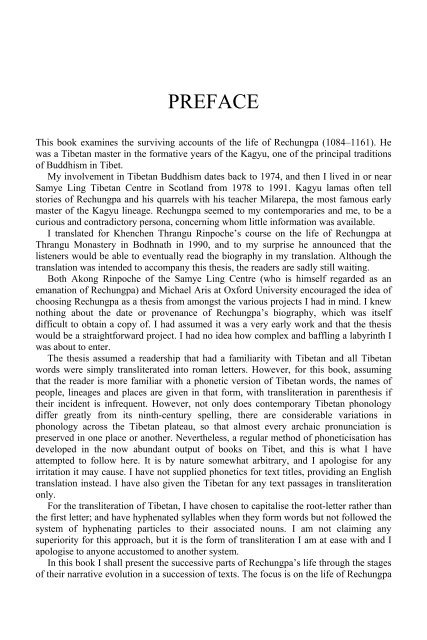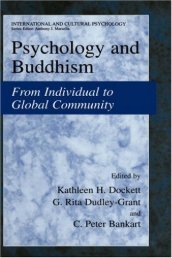The Biographies of Rechungpa: The Evolution of a Tibetan ...
The Biographies of Rechungpa: The Evolution of a Tibetan ...
The Biographies of Rechungpa: The Evolution of a Tibetan ...
Create successful ePaper yourself
Turn your PDF publications into a flip-book with our unique Google optimized e-Paper software.
PREFACE<br />
This book examines the surviving accounts <strong>of</strong> the life <strong>of</strong> <strong>Rechungpa</strong> (1084–1161). He<br />
was a <strong>Tibetan</strong> master in the formative years <strong>of</strong> the Kagyu, one <strong>of</strong> the principal traditions<br />
<strong>of</strong> Buddhism in Tibet.<br />
My involvement in <strong>Tibetan</strong> Buddhism dates back to 1974, and then I lived in or near<br />
Samye Ling <strong>Tibetan</strong> Centre in Scotland from 1978 to 1991. Kagyu lamas <strong>of</strong>ten tell<br />
stories <strong>of</strong> <strong>Rechungpa</strong> and his quarrels with his teacher Milarepa, the most famous early<br />
master <strong>of</strong> the Kagyu lineage. <strong>Rechungpa</strong> seemed to my contemporaries and me, to be a<br />
curious and contradictory persona, concerning whom little information was available.<br />
I translated for Khenchen Thrangu Rinpoche’s course on the life <strong>of</strong> <strong>Rechungpa</strong> at<br />
Thrangu Monastery in Bodhnath in 1990, and to my surprise he announced that the<br />
listeners would be able to eventually read the biography in my translation. Although the<br />
translation was intended to accompany this thesis, the readers are sadly still waiting.<br />
Both Akong Rinpoche <strong>of</strong> the Samye Ling Centre (who is himself regarded as an<br />
emanation <strong>of</strong> <strong>Rechungpa</strong>) and Michael Aris at Oxford University encouraged the idea <strong>of</strong><br />
choosing <strong>Rechungpa</strong> as a thesis from amongst the various projects I had in mind. I knew<br />
nothing about the date or provenance <strong>of</strong> <strong>Rechungpa</strong>’s biography, which was itself<br />
difficult to obtain a copy <strong>of</strong>. I had assumed it was a very early work and that the thesis<br />
would be a straightforward project. I had no idea how complex and baffling a labyrinth I<br />
was about to enter.<br />
<strong>The</strong> thesis assumed a readership that had a familiarity with <strong>Tibetan</strong> and all <strong>Tibetan</strong><br />
words were simply transliterated into roman letters. However, for this book, assuming<br />
that the reader is more familiar with a phonetic version <strong>of</strong> <strong>Tibetan</strong> words, the names <strong>of</strong><br />
people, lineages and places are given in that form, with transliteration in parenthesis if<br />
their incident is infrequent. However, not only does contemporary <strong>Tibetan</strong> phonology<br />
differ greatly from its ninth-century spelling, there are considerable variations in<br />
phonology across the <strong>Tibetan</strong> plateau, so that almost every archaic pronunciation is<br />
preserved in one place or another. Nevertheless, a regular method <strong>of</strong> phoneticisation has<br />
developed in the now abundant output <strong>of</strong> books on Tibet, and this is what I have<br />
attempted to follow here. It is by nature somewhat arbitrary, and I apologise for any<br />
irritation it may cause. I have not supplied phonetics for text titles, providing an English<br />
translation instead. I have also given the <strong>Tibetan</strong> for any text passages in transliteration<br />
only.<br />
For the transliteration <strong>of</strong> <strong>Tibetan</strong>, I have chosen to capitalise the root-letter rather than<br />
the first letter; and have hyphenated syllables when they form words but not followed the<br />
system <strong>of</strong> hyphenating particles to their associated nouns. I am not claiming any<br />
superiority for this approach, but it is the form <strong>of</strong> transliteration I am at ease with and I<br />
apologise to anyone accustomed to another system.<br />
In this book I shall present the successive parts <strong>of</strong> <strong>Rechungpa</strong>’s life through the stages<br />
<strong>of</strong> their narrative evolution in a succession <strong>of</strong> texts. <strong>The</strong> focus is on the life <strong>of</strong> <strong>Rechungpa</strong>











